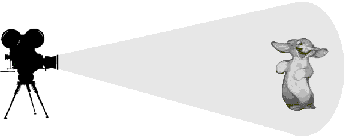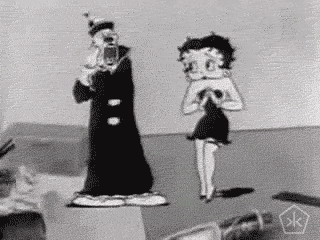
The magic lantern is still the unsung hero in the development of the movies. All the scientific innovations were fully explored by the early lanternists in their quest for moving pictures. Kinetic slides of amazing degrees of complexity simulated movement using glass as the transparent medium for projection, it was only in the plastic age however that sustained movement could be achieved. In many ways the magic lantern was more advanced it could project sharp pictures with dazzling colour effects something which film would have to wait 40 years to achieve. Indeed the early movie projectionists soon realized this and made moving projectors that still were capable of showing magic lantern slides.

A slip slide comprised of two pieces of glass one static and one moveable. In this slide the monster is static and the eyes are on the moveable piece causing the monster to move eyes left to right to create a scary effect

By the use of a cogged wheel on a circular piece of glass a rotational movement could be achieved by means of a pinion wheel attached to a handle. In this slide a dazzling kaleidoscope effect moves around the outside while the centre section creates bees buzzing around a hive.


A box of Mickey Mouse magic lantern slides, early cinema movies were often duplicated as slides thus providing an increased source of revenue. Felix the Cat one of the new generation of great movie stars.

A picture of a hand cranked movie projector called a Biokam, notice how it is an attachment for a magic lantern rather than a complete projection unit .


A picture of a child's toy cine projector, notice how, as shown in this illustration, it also can project long strips of glass slides

An advertisement for a pathescope home movie projector ,well known cartoon characters like Betty Boop, Popeye and Mickey Mouse are already stars.



Magic lantern slides (and lanterns) were still used in cinemas as a way of advertising local services but, by the 1950s the majority of these were gone too. The great days of the magic lantern were over